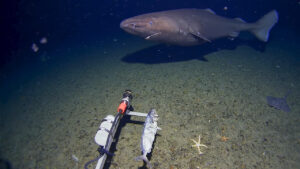A passion for the natural world drives many of our adventures. And when we’re not actually outside, we love delving into the discoveries about the places where we live and travel. Here are some of the best natural history links we’ve found this week.
This eagle is very, very lost: Birdwatchers have spotted a Stellar’s sea eagle in eastern Canada, 7,600km from home. “It’s almost as far away from your origin as you can be,” said Andrew Farnsworth of the Cornell Lab of Ornithology. The rare bird normally lives in China, Japan, Korea, and the Russian Far East. No one has ever seen them near the Atlantic Ocean. “I couldn’t believe it. Something like this is just one in a million,” said one expert in bird migration.

But where’s the ice? The penguin in question. Photo: Allanah Purdie/Department of Conservation New Zealand
A penguin’s progress
Penguin swims from Antarctica to New Zealand
Episode two in this week’s Gone Astray category: An Adelie penguin swam 3,000km from its home in Antarctica to New Zealand. A local resident thought that a toy had washed up on shore unless the bird moved its head. It was unclear what prompted the unusual migration. The penguin was dehydrated and hungry after its marathon swim. After shoring it up with some water and a “fish smoothie”, conservation officials released it back into the wild.
Daylight saving time reduces deer-vehicle collisions: Daylight saving ended in the U.S. and Canada on November 7. The debate over the time change has raged for years. Now a new risk of standard time has emerged: The chances of a deer-vehicle collision increase. Deer are most active around dusk and dawn. In the first few weeks of November, there are over four times as many deer-vehicle accidents as in spring. As night falls sooner, more cars are on the road at dusk. This causes a 72% rise in accidents during commuter hours.

A harbor seal hides in a kelp forest. Photo: Shutterstock
Coastal darkening harms kelp forests: Fertilizers that run into the water increase the growth of algae, and that adds to pollution to cloud coastal water. This stops sunlight from reaching the photosynthetic organisms that rely on it for energy. Among other things, it impacts the growth of kelp forests. As the kelp forests diminish, we are losing an essential carbon sink. This amplifies climate change.
A puzzling route change
Some songbirds now migrate east to west: In autumn, Richard’s pipits leave Siberia’s grasslands for warmer climates. But the little songbirds are starting to use a new westerly route. This is the first known long-distance migration on an east-west axis. Songbirds normally migrate alone and follow a route by instinct, so changes like this are very rare.
Why do dogs tilt their heads? Heat tilting in dogs is a universally endearing trait. Scientists have accidentally linked the behavior to a dog’s memory. While studying canines’ ability to learn words, they found that dogs often tilt their heads while listening to their owners. The lovable head tilt could be a sign that the dog is paying attention, or matching a word to a visual image in their head.

An Australian Shepard puppy tilts its head. Photo: Shutterstock
Coastal saltmarsh engineered to fight climate change: Scientists have re-flooded coastal wetlands in Scotland so they can use sea-level rise to fight climate change. They removed seawalls to allow water to flood back in. Then they waited for the wildlife to respond. The soil and plants in the salt marsh are now rich in carbon and are absorbing greenhouse gases.
Ancient Egyptian bees in danger: Honeybees were a symbol of wealth in ancient Egypt. Ancient Egyptians used the bees to harvest honey and beeswax. The beeswax was central to mummification, wound dressing, and medicine. The Egyptians even built rafts to move the bees up and down the river to aid pollination. While this continues today, the species of bee has changed. The “Pharaonic” honeybee is now only found in Egypt’s Wadi Al-Assiut nature preserve, and scientists are struggling to keep them from extinction.






